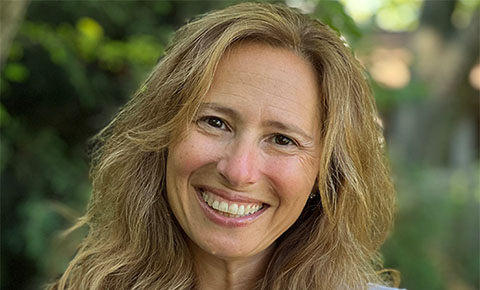Shapiro Promoted to Associate Professor of Instruction

Northwestern University sociologist Lilah Shapiro, who is known for inspiring her students to think carefully and critically about their responsibilities in our complicated world, has been promoted to associate professor of instruction at the School of Education and Social Policy.
Twice voted one of Northwestern’s most outstanding professors, both by SESP students and Associated Student Government, Shapiro forges important personal connections that extend well beyond the classroom.
She is the teacher who–as a trained classical musician–might belt out a memorable rendition of “For Good” from the musical Wicked on the last day of class. She helps her students land Undergraduate Research Grants, offers extensive but even-handed feedback on their work, and checks in on them long after she is no longer their official instructor.
Shapiro has been the faculty sponsor for more than 56 student applications to grants related to undergraduate research projects – a Northwestern record– and in the last five years alone, she has sponsored 7 students through the Undergraduate Research Assistant Program, 17 students successfully funded on independent projects, and 11 students on Expo presentations (oral and poster).
In addition, Shapiro has served as an honors thesis advisor for 20 students over the last five years. She mentored nearly all the students to successful research grant applications, and three students received multiple undergraduate research grants.
But her commitment to her students doesn’t end when they submit their thesis or at the end of the quarter. She supports her Advanced Methods students throughout the summer as they refine their projects, negotiate the Institutional Review Board, and secure an advisor.
“Lilah is an exemplary mentor and fierce advocate for undergraduate researchers,” said Megan Wood, associate director of the Undergraduate Research Program at Northwestern. “She is highly committed to providing students deeper and more substantive interactions with faculty, and she challenges them to think about learning.”
Shapiro earned her doctorate in comparative human development from the University of Chicago and her bachelor’s degree in English and vocal performance from Oberlin College. Her research interests include everything from life stories, ethnicity and religion to immigration, American culture and diaspora experiences.
Since coming to Northwestern she has created four original courses: Religion, Identity, and Society Race and Ethnicity, Understanding Knowledge and Identity, Intersections, and Organizations.
She studies beliefs, both big and small. In 2021, she received a Provost Grant for Faculty Research in the Humanities, Social Sciences, and Arts to examine the relationship between gun owners, religion, and faith. At least four undergraduate students have worked on the project.
In the classroom, she transformed the required and once-dreaded course, Methods of Observing Human Behavior, into a relevant and popular class, giving students the rigorous social science research skills they need for a successful practicum.
Then she created a new required class on the hairy issue of what it means “to know.” The class, “Understanding Knowledge” underscores SESP’s mission: Innovating the power of knowledge to create positive change in students. The class examines how we build knowledge and challenges students to engage with ideas they find offensive.
“Professor Shapiro taught me to think, and to not be afraid of failure or not knowing the answer,” said undergraduate Faye Berger. “I learned to relish challenges, both academic and personal.”
Shapiro lectures when necessary, but feels people thrive during discussion, debate, active exercise and project-based learning. Her courses are often seminar style and offer a variety of perspectives.
A leader in classroom innovation and assessments, she dropped grades in Observing Human Behavior; instead offering individual conferences and feedback in one-on-one meetings. Students grade themselves–they say they work harder without grades–and Shapiro almost always agrees.
Another important bonus: The meetings help build a personal connection, something she deeply values.
She was a firm, but fair adviser,” said alumna Sumaia Masoom (BS18). “She did not hesitate to provide constructive criticism and encouraged me to dive deep into the discomfort of being wrong, while also sharing stories of her own mistakes as a student.
“More than three years after graduation, she continues to be one of my most influential mentors,” Masoom said. “I am better able to advocate for myself, feel confident in skills and yet honestly admit my flaws, because of her teachings.”